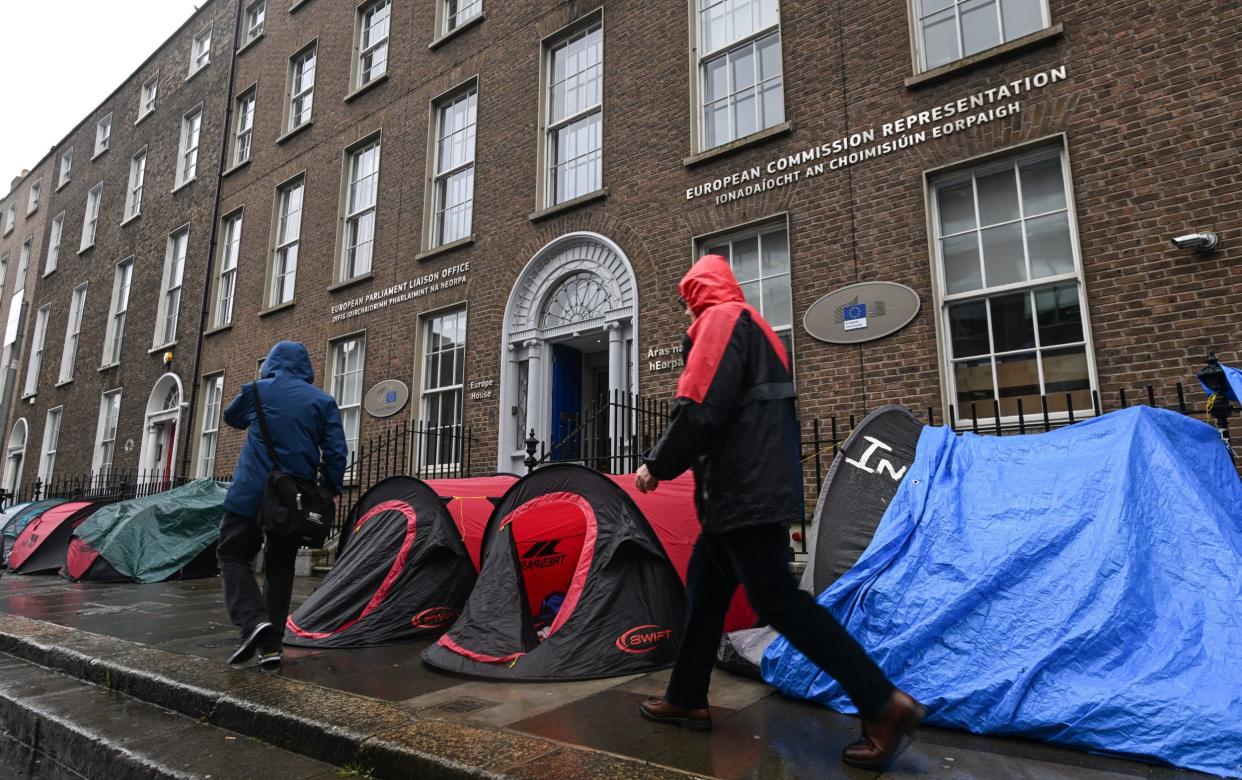There’s a trap for Britain in Ireland’s Brexit hypocrisy

A couple of years ago, I noted in passing on Twitter (as it then was) that there was an international border between the UK and Ireland on the island of Ireland. To my surprise, Irish nationalists piled in to deny this objective legal reality. I couldn’t help recalling George Orwell’s comment that, for nationalists, “a known fact may be so unbearable that it is habitually pushed aside … or on the other hand it may enter into every calculation and yet never be admitted as a fact.”
Or indeed both of those things. Such doublethink is evident in the Irish government’s handling of the current migration row with Britain. In fact, it is not at all clear that the asylum and immigration problem in Ireland has been much boosted, let alone created, by our Rwanda policy. But it suits the Irish establishment to claim that it’s the Brits’ fault, and certainly one can empathise, if not exactly sympathise, with their wish to outflank the Sinn Fein monster – even if they do expect us to put up with it in Belfast.
The problem this gives the Irish is that, having decided to blame us, they must try to control movement of asylum seekers south across the border, while maintaining their long-standing position that there must be no controls at that border. Not surprisingly, this is hard to carry off and they can only do so by claiming that the necessary controls are non-intrusive and don’t need to be at the border.
This probably all sounds wearisomely familiar. It’s certainly awkward for the Irish, because it is the same as the British position on customs and trade in late 2019 and again in the abandoned Northern Ireland Protocol Bill. We argued that the customs border could be at the land border, managed through exactly such behind the border checks and appropriate legal enforcement. We were told that this was simply impossible, a “unicorn”, and would risk violence. In 2019, Parliament forced us to back down. In 2023, it was the British Government that backed down and signed the Windsor Framework instead. That’s why we have the current mess.
In responding to this latest crisis, the British Government, from the Prime Minister down, has chosen to enjoy the turned tables and lecture the Irish about the value of maintaining an open border. Irish self-righteousness makes this totally understandable, but it still misses the point. It is a feel-good tactic not an actual strategy.
For one thing, we aren’t immune to the same problems. One might forget, from the PM’s comments, that the British Government will soon require an ETA, a travel authorisation, for non-resident third country nationals travelling from Ireland to Northern Ireland. Presumably, we intend to police this in some way – and indeed who can really doubt that, if for some reason, the flow of illegal migrants was in the other direction, we would seek to make that requirement bite as close to the border as we could?
For another, how can it possibly be in our interests now to be arguing for an open border, when Irish and EU demands for this have caused so much damage to our interests? We want, or should want, a meaningful land border. We really shouldn’t be arguing for it to become even less significant than it is now, with third country nationals able in practice to wander across it at will.
So, even if it goes against the grain, the correct course of action is to let the Irish do what they want, noting that this is entirely achievable without fences and border posts. In an ideal world, we would then go on to argue the same could be done for goods and customs arrangements, too, but unfortunately the Government, at least under current leadership, has sold that pass with the Windsor Framework.
Still, the precedent is set; and just because we can’t do the latter doesn’t mean we have no interest in the former.
Like it or not, the United Kingdom and Ireland are deeply entwined as countries and as people for a whole raft of historical and political reasons. The Common Travel Area, the fact that anyone born in Northern Ireland may choose Irish citizenship, the common voting rights, all this is highly unusual among two independent countries. But it is precisely this deep intertwining that means we have to be clear about fundamentals.
One of those fundamentals is clarity about the border. We currently have a border for people in one place, a border for customs in another place, and both British and Irish governments denying that one or other of them really exists at all. This Schrödinger’s border isn’t going to work. The current arrangements may be intended to avoid friction but will in fact generate endless anomalies, instability, and conflict. They can’t last.
In the end, the legal border can only be in one place not two, and everyone must agree on where. The only long-run stable situations are for it to be at the current land border or in the Irish Sea. If we don’t want it to be the latter, we must show it can work when it’s at the former.

 Yahoo News
Yahoo News 
